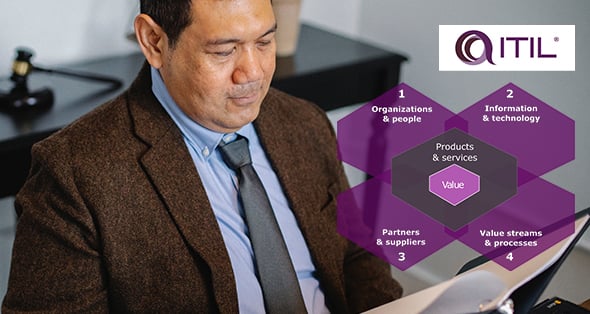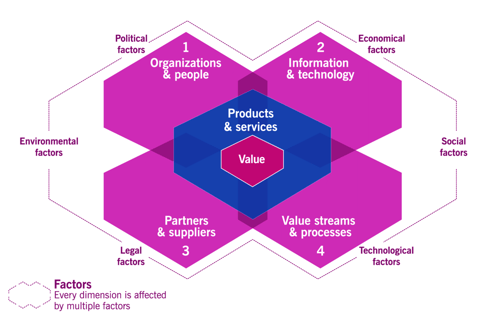 As IT and cybersecurity become increasingly involved in contracts, project managers looking to improve project performance need to consider using ITIL®. In today’s world of tight budgets, delayed projects, and constant staff reductions, project managers are looking for different ways to run their projects. Having foundational technical competence is not enough when working with IT departments on a project. Project Managers must focus not only on technology, but people and process as well. ITIL is the most widely accepted approach to IT service management and is relevant to any Project Manager working with IT services on a project. Here is an introduction to ITIL and it's importance in improving project performance.
As IT and cybersecurity become increasingly involved in contracts, project managers looking to improve project performance need to consider using ITIL®. In today’s world of tight budgets, delayed projects, and constant staff reductions, project managers are looking for different ways to run their projects. Having foundational technical competence is not enough when working with IT departments on a project. Project Managers must focus not only on technology, but people and process as well. ITIL is the most widely accepted approach to IT service management and is relevant to any Project Manager working with IT services on a project. Here is an introduction to ITIL and it's importance in improving project performance.
What is ITIL®?
ITIL® (IT Infrastructure Library) is a set of detailed practices for IT service management (ITSM) that focuses on aligning IT services with the needs of the organization IT supports. Simply put, ITIL is a recognized best practice for IT to support organizational strategies through an effective partnership with the business. There are 3 main areas of focus:
- Co-creating value with clients.
- Continual improvement – quality/costs
- Expanding services to support strategies
ITIL describes processes, procedures, tasks, and checklists which are not organization-specific nor technology-specific, but can be applied by an organization for establishing integration with the organization's strategy, delivering value, and maintaining a minimum level of competency. It allows the organization to establish a baseline from which it can plan, implement, and measure.
ITIL is managed by AXELOS, and is part of their Best Practice Solutions portfolio, which are designed to help organizations become more effective across a range of key business capabilities including IT Service Management, project, programs, and security.
ITIL Terms
ITIL may be hard to understand to some because of the numerous terms involved. There are acronyms and abbreviations that can confuse even the higher level and trained employees. Here are the top 5 most frequently used ITIL terms:
1. Service Management - A set of specialized organizational capabilities for providing value to customers in the form of services.
2. Change Management - The process responsible for controlling the lifecycle of all changes, enabling beneficial changes to be made with minimum disruption to IT services.
3. Asset Management - A generic activity or process responsible for tracking and reporting the value and ownership of assets
throughout their lifecycle. See also service asset and configuration management; fixed asset management; software asset management.
4. Configuration Management - The process responsible for ensuring that the assets required to deliver services are properly
controlled, and that accurate and reliable information about those assets is available when and where it is needed. This information includes details of how the assets have been configured and the relationships between assets.
5. Incident Management - The process responsible for managing the lifecycle of all incidents. Incident management ensures that normal service operation is restored as quickly as possible and the business impact is minimized.
Why is ITIL Relevant to Project Managers?
The ITIL® framework is the most widely-used framework of best practices for IT Service Management (ITSM). Many project managers deliver IT components to our projects. And the service régime that starts when we hand them over will often dictate the value of the products we’ve created. Because of that, Project Managers need to be mindful of this in designing our products, delivery, and handover.
And, whether you are an IT Project Manager or not, you may find yourself delivering IT-related projects. These may be in the form of hardware, infrastructure, software, or service processes as a part of your projects. So, that means you need a basic understanding of ITSM.
What is IT Service Management?
IT Service Management (ITSM) is the group of activities, policies and processes performed by an organization to design, plan, deliver, operate and control information technology. ITSM focuses on customer needs, internal or external, adopting change management and continuous process improvement.
Why is ITSM Important to My Project?
Implementing ITSM can help any project establish processes through structured delivery and documentation. With a process in place IT teams streamline activities and support resulting in reduced costs and increased continuity. Most importantly, implementing ITSM has opens the door for IT insights to that help the project stakeholders take action and make decisions. Benefits range from:
- process implementation based on best practices
- increased visibility and understanding of IT support and services
- allows IT to better understand and support the organizations needs
- increased support for regulatory and compliance challenges
- reduce the impact of incidents and downtime
GET PMP® PDUs and CISSP CPEs with ITIL Training
ITIL training counts towards PDUs for both PMP and CISSP certified professionals. The total number of PMP® PDUs is either the total course duration or the hours specified by the education provider. In order to ensure PMI would accept the PDU claim readily, do try to find a course provided by a PMI Authorized Training Partner (registered education provider) such as New Horizons Government Training Solutions (NHDoD).
Attending a course by a PMI Authorized Training Partner allows you to claim Category A PDU, otherwise, you can only claim Category B PDU (In this category, PMI would need more in-depth information about the course than the certificate alone in order to assess your PDU claim). For example, look at ITIL4 Foundation course to get started.
ISC(2) grants Group B credits for ITIL training. Credits are earned for completion of general professional development activities which enhance your overall professional skills, education, knowledge, or competency outside of the domains associated with the respective certifications. Some examples are shown below:
- Attending non-security industry conferences
- Participating in non-security education courses
- Preparing for non-security presentation/lecture/training
- Non-Security Government/Private Sector/Charitable Organizations Committee
The CPE categories will provide the number of credits you can earn for each activity. Typically, you will earn one CPE credit per one-hour time spent in an activity. You can report CPE credits in 0.25, 0.50 and 0.75 increments. However, some activities are worth more credits due to the depth of study or amount of ongoing commitment involved. In general, CPE credits are not earned for normal on-the-job activities. If the CPE activity occurred over multiple days, the end date is used to determine eligibility for a particular certification cycle. For example, if the activity started 1 August 2020 and ended on 5 September 2020, the CPE credit can be applied to any cycle that was active on 5 September 2020.
How can ITIL Improve Project Performance?
Whenever a project manager needs to be involved in IT services in any way, ITIL it is a great qualification to have. The foundation level means you will understand the context in which you are working. If you are or aspire to be an IT project manager, ITIL becomes all the more valuable.
ITIL will help you understand how IT service managers identify, design, implement, manage, and improv their services. And this mirrors the traditional project lifecycle stages:
- Definition
- Planning
- Delivering (with monitoring and controlling)
- Close
The outcome of your IT projects will often become IT services. For example, roll-out of new desktop software will led to a need for monitoring and support.
Project Manager: Expert or Non-expert?
A common debate is whether a project manager needs to be an expert in the subject matter of your project, to deliver it successfully. After all, there are experts you can call on, to help you through your project. But then, if you are to make sound decisions, perhaps you need the technical insight.
The answer has to be balance. I suggest you do not need to be an expert in everything you do. That would be impossible. But you do need a certain amount of background knowledge and understanding. This makes ITIL Foundation and valuable learning resource.
A good project manager must have a breadth of knowledge to mix your management and leadership skills with some relevant technical skills. So, you may have an ITIL expert on your team, but you need enough knowledge to understand the context of how they advise you.
Critical concepts / models
The following model shows the factors that work into the areas of focus for ITIL.

- Focus on Value
- Start Where You Are
- Progress Iteratively with Feedback
- Collaborate and Promote Visibility
- Think and Work Holistically
- Keep It Simple and Practical
- Optimize and Automate
Project Management Careers
Project Management is a competitive market. There may be a shortage of project managers, but which jobs do you want? If you want your pick of the prime jobs, there are a few certifications to look at:
- ITIL
- PMP
- Six Sigma
Payscale.com shows that the average salary for a project manager is $88,841. IT Project Management is also listed as one of the Top 21 Pandemic Proof Careers. An added bonus for these certifications is that they can be applied to any department of a company, which means you will have more doors opened than just that to IT. Here are 3 steps to move from project manager to IT manager.
How Much Does ITIL certification cost?
The cost of getting ITIL certified will depend on what level of training you are undertaking.
- Awareness course costs $795
- Foundation course costs $1,895
- Intermediate courses cost $2,385
- Expert Course costs $3,975
TAKE AN ITIL 4 FOUNDATION CLASS
This is hands-down the best way to ensure success on the exam. It’s a two-day course, so you won’t have to be away from the office for long (Plus, if you’re PMP or CISSP certified, it’s a great way to pick up 16 continuing education credits or PDUs). Can you take the exam without the class? Sure, but it will dramatically increase your study time – and stress level. These conversations provide insight into how to implement ITIL concepts (including common pitfalls to avoid), which is hopefully the reason you’re interested in getting certified in the first place.
When you enroll into an ITIL course with New Horizons, an exam voucher will be included in the training and certification course.
ITIL® is a (registered) Trade Mark of AXELOS Limited. All rights reserved.


